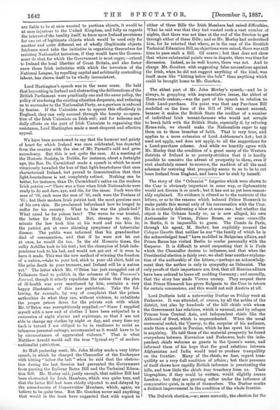We have been accustomed to say that the humour and
gaiety of heart for which Ireland was once celebrated, has departed from the country with the rise of Mr. Parnell's cold and grim ascendency. But this is not quite the case. At a meeting of the Historic Society, in Dublin, for instance, about a fortnight ago, the Rev. Dr. Carmichael made a speech in which he most vivaciously bewailed the loss of that light-heartedness that once characterised Ireland, but proved to demonstration that that light-heartedness is not completely extinct. Nothing can be better, for instance, than Dr. Carmichael's satire on the modern Irish patriot,—" There was a time when Irish Nationalists were ready to do and dare, aye, and die, for the cause. Such were the men of '98, such were the men of '48, such were the Feniana of '65 ; but their modern Irish patriot took the most precious care of his own skin. He proclaimed beforehand how he longed to suffer for his country. What to him was the plank-bed P What cared he for prison fare ? The worse he was treated, the better for Holy Ireland. But, strange to say, the minute the law took him at his word and ran him in, the patriot got at once alarming symptoms of tubercular disease. The public were informed that his grandmother died of consumption, and that if he were not let out at once, he would die too. In the old Homeric times, the sulky Achilles took to his tent ; but the champion of Irish inde- pendence took to his bed, and would not get out of it even to have it made. This was the new method of winning the freedom of a nation,—take to your bed, stick to your old shirt, hold on like grim death to your trousers, and Ireland will be a nation yet." The letter which Mr. O'Brien has just smuggled out of Tullamore Gaol to publish in the columns of the Freeman's Journal, though it utterly repudiates the notion that the plea of ill-health was ever sanctioned by him, contains a very happy illustration of this new patriotism. Take the fol- lowing, for example, by way of complaint that the prison authorities do what they can, without violence, to substitute the proper prison dress for the private suit with which Mr. O'Brien was surreptitiously supplied :—" Since I supplied myself with a new suit of clothes I have been subjected to a succession of night alarms and espionage, so that I am not able to change my clothes by night or day, and every time my back is turned I am obliged to be in readiness to resist an infamous personal outrage, accompanied as it would have to be by circumstances of aggravated violence." That is what Matthew Arnold would call the true "lyrical cry" of modern nationalist patriotism.









































 Previous page
Previous page